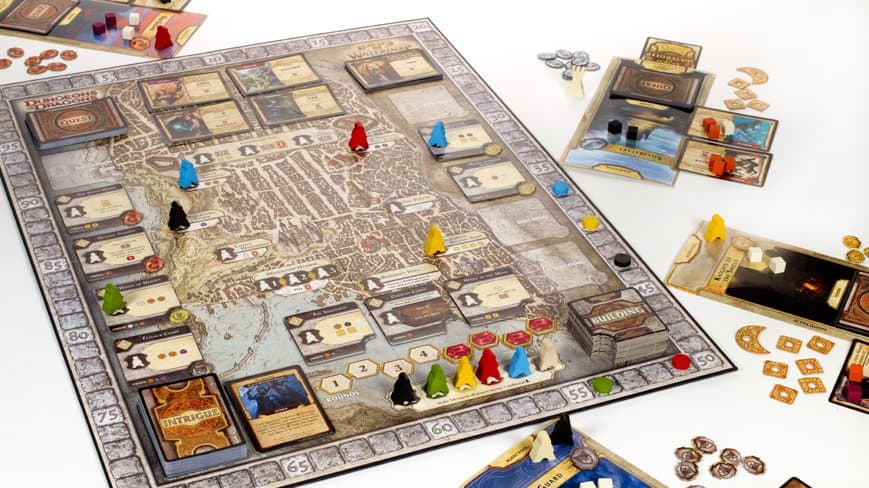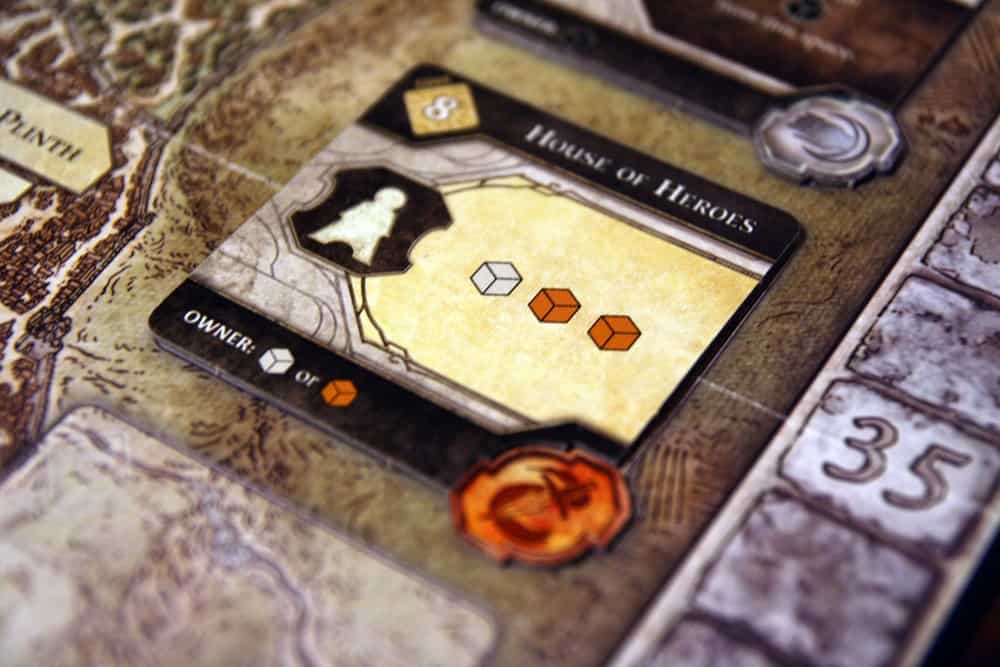In the bustling streets of Waterdeep, a city teeming with intrigue and shadows, noble houses vie for power and influence in the pursuit of their hidden agendas. This is the world of Lords of Waterdeep, a game where players become cunning lords and ladies who operate in the shadows, maneuvering resources and agents like knights on a chessboard.
From the towering spires of Blackstaff Tower to the murky depths of Skullport, the fate of Waterdeep lies in the hands of these lords, whose alliances and rivalries shape the destiny of the city and its people. With every strategic move, each player inches closer to dominance, their machinations echoing through the pages of history like a gripping tale from the annals of Tolkien’s Middle-earth.
What’s included in Lords of Waterdeep

- Game Board: Depicts the city of Waterdeep, divided into locations where quests are completed and resources are gathered.
- Lords of Waterdeep Cards: These represent the secret lords and ladies players control, each with unique scoring conditions.
- Intrigue Cards: These add twists and turns to the game, offering special abilities or hindrances.
- Adventurer Cubes: Represent different types of adventurers (clerics, fighters, rogues, and wizards).
- Quest Cards: Display the requirements and rewards for completing quests.
- Victory Points (VP) Tokens: Used to track players’ scores.
- Gold Tokens: The game’s currency.
- Agent Meeples: Represent your agents and are used to take actions on the board.
- Ownership Markers: Indicate which player controls each building or spot on the board.
How to play Lords of Waterdeep

Setup
- Place the game board in the center of the table.
- Shuffle the Lords of Waterdeep cards and deal one face-down to each player. Players look at their cards secretly and keep their lord’s identity hidden.
- Shuffle the Intrigue cards and place them face-down in a draw pile.
- Place the Adventurer cubes, Quest cards, VP tokens, and Gold tokens nearby as a supply.
- Each player receives:
- Two agents (meeples) in their color.
- Four Gold.
- A number of VP tokens based on their lord card.
- Prepare the building tiles by placing them face-up on the board according to their designated spots.
Gameplay
Lords of Waterdeep is played in rounds, with each round consisting of several phases:
- Assign Agents: Players take turns placing their agents on different buildings and locations on the board, performing the associated actions. Agents are placed one at a time.
- Complete Quests: Players can complete quests by spending the required adventurers and gold, gaining rewards in the form of VP and sometimes additional adventurers or Intrigue cards.
- Draw New Quests: Players can draw new Quest cards from the Quest card display, keeping one or more if they choose.
- Play Intrigue Cards: Some buildings and completed quests allow players to play Intrigue cards. These cards can have various effects, such as stealing resources or forcing opponents to complete unwanted quests.
- Scoring: Players reveal their lord cards and receive VP tokens based on their completed quests and any other scoring conditions their lord specifies.
- Reset Agents: All agents are returned to their owners.
- First Player Marker: Pass the first player marker clockwise to the next player, and start a new round.
Ending the Game: The game ends after a set number of rounds. The player with the most VP wins. If there’s a tie, the player with the most unspent resources (gold, adventurers) wins.
For the official rules, see the link below:
Strategies for controlling Waterdeep itself
1. Diversify Your Quests:
- At the beginning of the game, it’s a good idea to diversify your quest types. Try to complete quests of various colors and reward types. This allows you to collect a broad range of adventurers and gold, making it easier to fulfill any quest requirement.
2. Focus on Your Lord’s Agenda:
- Pay close attention to your lord card’s scoring conditions. Concentrate on completing quests that align with your lord’s agenda. These quests often provide substantial bonus points.
3. Control Key Buildings:
- Acquiring and controlling key buildings is crucial. Buildings that generate resources (adventurers or gold) can provide you with a steady income. Controlling buildings that allow you to draw and play Intrigue cards also provides strategic advantages.
4. Optimize Your Agent Placement:
- Early in the game, prioritize using your agents to acquire buildings that generate resources or provide additional actions. These buildings can help you build an efficient engine for completing quests later on.
- Later in the game, focus on completing quests and using any bonus actions you’ve acquired. Avoid using your agents on spaces that only provide resources unless absolutely necessary.
5. Plan Your Intrigue Cards:
- Intrigue cards can be game-changers. Use them strategically to disrupt your opponents or to gain an advantage. For example:
- Mandatory Quest cards can slow down your opponents by forcing them to complete an unwanted quest.
- Use “Take That!” cards to steal resources or complete quests in your opponents’ taverns.
- Play “Draw 2 Quests / Play 1 Quest” cards when you need more quest options.
6. Balance Your Resources:
- Keep a balance of adventurers and gold. Some quests require one resource type exclusively, while others need a mix of both. Having a diverse pool of resources makes it easier to complete quests.
7. Timing Is Critical:
- Pay attention to the game’s progress and adjust your strategy accordingly. Quests offering more VP become available as the game advances. Timing the completion of these quests can be crucial.
8. Block Opponents:
- Observe your opponents’ strategies and quests. If you see an opponent working towards a specific quest, consider taking it yourself to block them.
9. Know When to Reveal Your Lord:
- Revealing your lord early can help you focus on quests that align with your lord’s agenda. However, keeping it hidden can also be an advantage, as opponents won’t know what quests you’re prioritizing.
10. Adapt to Your Opponents: – Be flexible in your strategy and adapt to what your opponents are doing. If everyone is competing for adventurers, consider focusing on Intrigue cards or controlling key buildings instead.
11. Maximize Mandatory Quests: – If you receive a Mandatory Quest, try to complete it as quickly as possible. This frees you from its burden and can be an excellent way to disrupt an opponent’s plans.